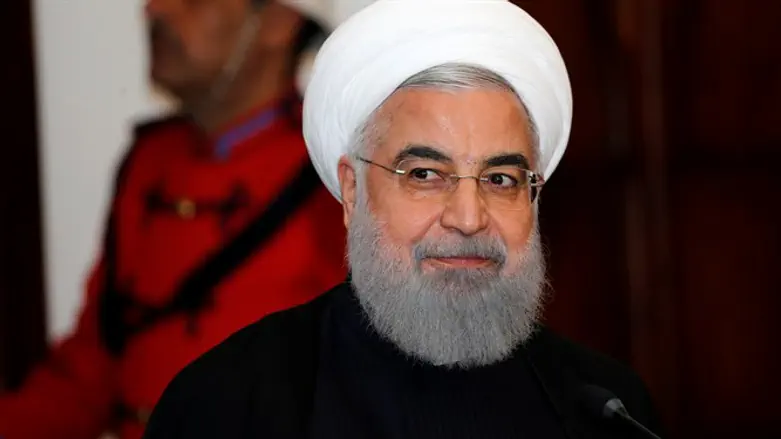
Journalist Zvi Yehezkeli, News 13's Arab affairs analyst, spoke with 103 FM Radio's Nissim Mishal about the rising tensions on Israel's northern border and IDF Chief of Staff Aviv Kohavi's warning that the situation may deteriorate.
Do the Iranians have an interest in conflict on the border?
"Certainly the answer is yes. The Israeli assumption up until now has been that Iran can hold back and does not want a general conflict. That's beginning to crack. I'll tell you what it's about. Until now Israel has been attacking all bases and attacking all Iranian entrenchment in Syria, for over two years. All of this was done with the understanding that Iran would be exposed and not want to respond.
"But what happened? Things in the Middle East are changing and Chief of Staff Kohavi is warning us: 'Right now we need to watch our step.' And I'll tell you, from Iran's perspective, they've made a decision. They decided first of all to stop putting up with all the Israeli attacks. That means from now on there'll be a response.
"We see that now as well, with [Hezbollah leader Hassan] Nasrallah's drones. It was a different Nasrallah. These are the buds of an awakening Iran. The other thing is, and this is the most important thing to understand here, Iran's attack on Saudi oil facilities. Iran is examining the world, Saudi Arabia, Israel, and the US, all at the same time, in a very precise attack. So Israel suddenly remembered that the Iranians have precise cruise missiles, and it also wants to protect itself."
Meaning the US' lack of response shows them that they can do what they want.
"Exactly. The US failed the test here. [US President Donald] Trump failed the huge test the Iranians gave him. What did he tell them? 'I'll keep quiet about this kind of thing.' And that harms the holy of holies. We were in the lead-up to elections and we didn't understand how powerful this is. It was a mega-attack in the heart of Saudi Arabia, its oil facilities, and the US kept quiet. The Gulf States were in shock, they went to ask Iran for protection. They're already collapsing in front of it.
"It's already not a Sunni bloc that can fight against the Iranians. They're afraid of them and Saudi Arabia gave in, it was caught in its moment of weakness. After that the Iranians came and said now that 'any response' or 'any Israeli action will receive an appropriate response' and that puts us now on the brink of a low-scale conflict with the Iranians, which we didn't want to have happen, and it exposes you to a lot of things like the Iranian cruise missiles."
Do you believe that we and the Iranians are close to another round of fighting?
"If Israel continues attacking and sets a goal of ending the precise missile project and Iran's entrenchment, then the answer to your question is yes. But I think what will happen is that Israel will consider her next steps and avoid such a conflict. There's the Iranian deterrence. In answer to your question there is Iranian deterrence which has now come into play, and so we're close to such a conflict and it depends mostly on Israel. Because Israel is the active player here, which is trying to hinder the Iranians. I think that from now on Israel will watch her steps, it'll look different."
Meaning the Iranians have created a reality of fear. If you attack we'll attack back, big time.
"Exactly. And that happened because the Arab bloc, the US, Israel, and Saudi Arabia did not stand guard enough. Israel has to deal with Trump's third mistake in the area. The first mistake was that they shot down the UAVs and he said he's 'putting out planes' and turning them around at the last second - that's weakness. The second thing is that he requested a meeting with [Iranian President Hassan] Rouhani, and Rouhani didn't answer him. The third mistake was betraying the Kurds. It looks to the region like an American betrayal, like they won't protect the Saudis."
The Iranians know Israel's strength. Meaning they'll provoke and get revenge and then we'll say that the situation is deteriorating, and they understand that they're going to pay a heavy price.
"That's true, but until the major war in which Israel has true strength and power against Iran, and by the way we don't know how much superiority we really have over them, but okay, let's say that when it comes to forces, in a major war, Israel can hit them hard. But still in lower-scale conflicts response for response, hit for hit, UAV ping pong, missiles, here or there, the Iranians have an interest in bringing Israel to that point because that's a spot Israel hasn't been in and it worries Israel and deters Israel.
"Until the major war the Iranians still have points of strength superior to ours via their proxies, such as Hezbollah and the militias in Iraq which already have precise cruise missiles aimed at Israel. So I think that the Iranians have more wiggle room before we reach the point of a major conflict in which Israel has to 'rethink its route,' and that's basically what the Chief of Staff was saying yesterday."
So to sum up the conversation with you, we're facing another round of conflict if Israel continues its attacks.
"Correct, as a result of the American weakness which came to this area and the Iranians' understanding that basically, Israel, Saudi Arabia, and the US are weak."
